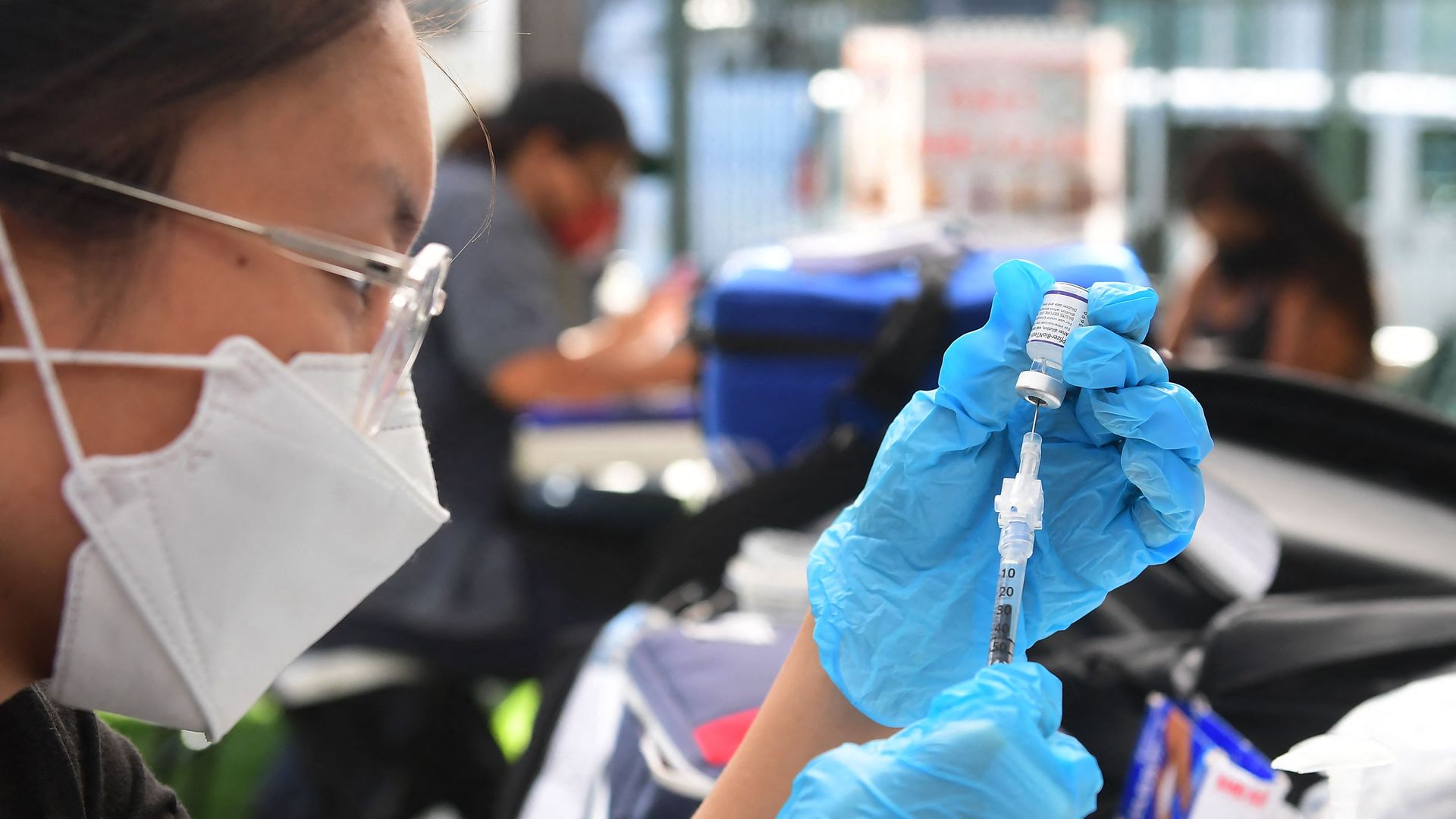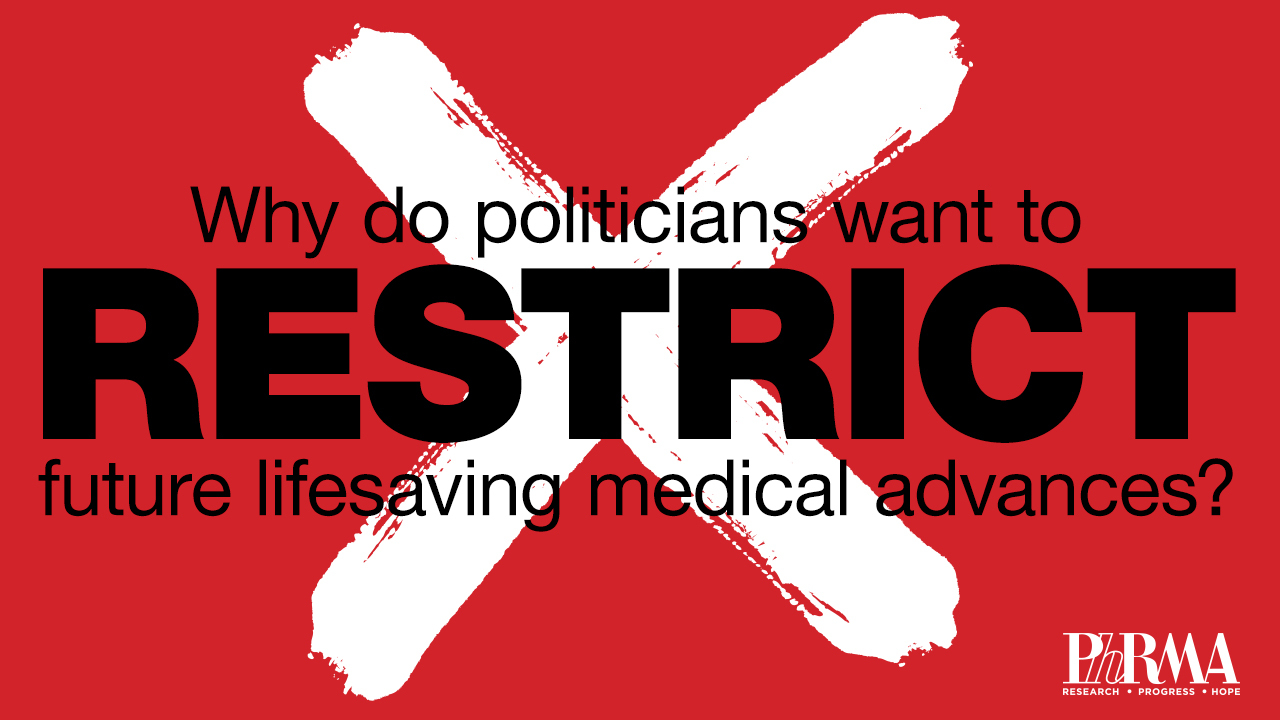Plus, Pfizer-BioNTech seek to expand boosters | Wednesday, November 10, 2021
| | | | | | | Presented By PhRMA | | | | Axios Vitals | | By Tina Reed ·Nov 10, 2021 | | Good morning, Vitals readers. Today's newsletter is 726 words or a 3-minute read. 🇺🇸 We will not be publishing a newsletter tomorrow in observance of Veteran's Day. Thank you to all of those who have served and their families. | | | | | | 1 big thing: Exclusive — vaccines for conflict zones |  | | | Illustration: Annelise Capossela/Axios | | | | The Biden administration is set to announce today that it has brokered a deal to get more doses of the Johnson & Johnson COVID vaccine into conflict zones around the world, a senior White House official tells Axios. Why it matters: Getting the rest of the world vaccinated will save lives — and reduce the chances of more new variants. How it works: J&J doses could previously only be used for official government vaccination programs due to liability concerns, a senior White House official said. - "The way vaccine manufacturers sell or give doses to countries ... is the recipient government essentially accepts legal liability for the doses. That's just the system we've developed," the official said.
- But in many humanitarian settings and conflict zones, there's no government entity to administer the doses and accept that liability.
- The U.S., J&J, and the global COVAX initiative built a "novel legal approach" in which J&J agreed to waive the legal liability it normally requires from a country for donated doses. J&J is essentially saying "we're going to let an NGO give them to people who are most vulnerable because the situation demands it," the official said.
- They said they expect it could be a model for donations from other vaccine makers.
As part of the deal, the U.S. government will also donate 1.5 million doses of extra domestic supply of J&J shots to COVAX for people in conflict zones or other humanitarian settings, such as for migrants or asylum seekers. - Secretary of State Tony Blinken is expected to announce the deal as part of a virtual meeting with foreign ministers today.
- He will also announce that the U.S facilitated a deal to make an additional 300,000 doses of J&J available for humanitarian, UN peacekeeping, and other frontline workers around the world.
|     | | | | | | 2. Vets had lower death rate than general population |  | | | County-level estimates of excess all-cause mortality during 2020 from the Veterans Health Administration's Corporate Data Warehouse. Screenshot: The Lancet Regional Health | | | | More U.S. veterans died in 2020 than in previous years. But the increase was less than among the general population during the pandemic, Axios' Marisa Fernandez writes from a new study published in The Lancet Regional Health. The big picture: Veterans tend to have higher risks of severe health outcomes from COVID-19 due to their age, and other conditions like hypertension, diabetes and obesity. By the numbers: The study, based on Veterans Health Administration data, showed 426,069 deaths among veterans from March–December 2020, a nearly 17% increase compared to previous years. Read more. |     | | | | | | 3. Pfizer-BioNTech seek to expand boosters |  | | | The Pfizer COVID-19 vaccine is prepared for administration. Photo: Frederic J. Brown/AFP via Getty Images | | | | Pfizer and BioNTech said Tuesday they asked the FDA to expand authorization of their COVID-19 vaccine booster to include anyone 18 and older, Axios' Yacob Reyes writes. Why it matters: If the FDA agrees, it could significantly increase the number of people eligible for a booster. - Currently, Pfizer-BioNTech and Moderna recipients are eligible to receive a booster six months after their second dose if they are 65 and older or an adult at high risk of severe infection.
- All Johnson & Johnson recipients over the age of 18 are eligible to receive a booster two months after receiving their first shot.
Where it stands: Colorado already says every resident over age 18 is eligible for a COVID-19 booster shot under federal guidelines because the virus is spreading so rapidly in that state, Axios' John Frank reports. What to watch: Moderna is also expected to request booster authorization for all U.S. adults soon. - But, the New York Times reports, that could be trickier because of concerns about rare cases of myocarditis, or inflammation of the heart muscle.
Related: Colorado sounds the COVID alarm as FEMA team arrives at hospitals |     | | | | | | A message from PhRMA | | The hyper-partisan drug pricing plan may be detrimental to patients | | |  | | | | It's government price setting that does little to address patient affordability and will decimate the US competitive ecosystem that has brought hope to so many Americans in the form of new medical advances. This plan could result in negative consequences for the patients with the most need. | | | | | | 4. Quote du jour | | "It is inexcusable that contractors are being given the entire holiday season to meet the mandates, while federal employees continue to be subject to the November 22 deadline. The effect upon morale of federal employees being subject to possible discipline at this time of the year cannot be overstated." — Everett Kelley, national president of the American Federation of Government Employees, the largest union representing federal workers, in a letter to the White House coronavirus response coordinator Jeff Zients. |     | | | | | | 5. Business notes |  | | | Photo Illustration: Rafael Henrique/SOPA Images/LightRocket via Getty Images | | | - General Electric plans to split into three public companies, including a health care company. (The Associated Press)
- Moderna and the NIH can't agree on who invented the lifesaving COVID-19 vaccine, and their feud is now public. (Endpoints News)
- DOJ investigating Oak Street Health. (Axios)
- Oklahoma court reverses $465M opioid verdict against Johnson & Johnson. (Axios)
|     | | | | | | A message from PhRMA | | The hyper-partisan drug pricing plan may be detrimental to patients | | |  | | | | It's government price setting that does little to address patient affordability and will decimate the US competitive ecosystem that has brought hope to so many Americans in the form of new medical advances. This plan could result in negative consequences for the patients with the most need. | | | | 📫 Enjoy this newsletter? Tell your friends to sign up, too! |  | | It'll help you deliver employee communications more effectively. | | | | | | Axios thanks our partners for supporting our newsletters. If you're interested in advertising, learn more here.
Sponsorship has no influence on editorial content. Axios, 3100 Clarendon Blvd, Suite 1300, Arlington VA 22201 | | | You received this email because you signed up for newsletters from Axios.
Change your preferences or unsubscribe here. | | | Was this email forwarded to you?
Sign up now to get Axios in your inbox. | | | | Follow Axios on social media:    | | | | | |








No comments:
Post a Comment